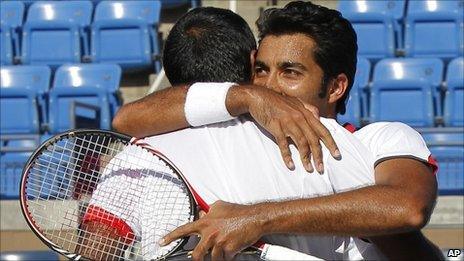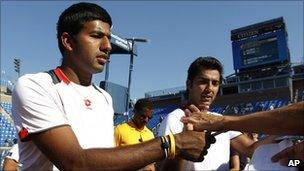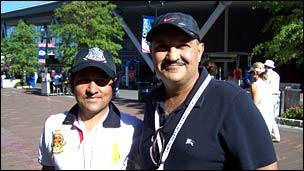South Asian tennis pair rally for peace at US Open
- Published

If we can be friends, so can our countries, the players say
"Stop War, Start Tennis" was the message from two players in Friday's men's doubles final at the US Open.
Rohan Bopanna of India and his partner Aisam-ul-Haq Qureshi of Pakistan say if they can be friends, so can their countries.
Seeded 16th, the so-called "Indo-Pak Express" were up against favourites Bob and Mike Bryan of the US. In the end they lost, but their fans' enthusiasm is undimmed.
The success of the South Asians has been making headlines at home - Qureshi also made it to the mixed doubles final on Thursday, but lost.
For Pakistanis, his exploits in New York are rare good news after devastating floods, a recent cricket corruption scandal and years of militant insurgency.
'Changing minds'
"It is the beauty of sport that it's above culture, politics and religion," says Qureshi, who is from Lahore. "So by pairing together through our tennis, we are trying to give a message of peace to people of India and Pakistan.
"It feels very good to see the Indian fans taking autographs from me and Pakistani fans taking Rohan's autographs.
"They also cheer the same team. Rohan always points out that even if we change the minds of 3% or 4% of people, it's worth it. And if we two can be friends together, then why can't other Indians and Pakistanis be friends?"
India and Pakistan have fought three wars since independence from Britain in 1947 and their relations are marked by mistrust.
But Bopanna says: "It doesn't matter to me whether it's an Indian or a Pakistani as my doubles partner.
"We travel together on tours, we have so much in common. Even the languages we speak - Aisam speaks Urdu, I speak Hindi - are also similar. And he is my good friend. So all this makes it so easy for us to play."

Bopanna, left, says they have so much in common
The men, who met when they were 16 and are now 30, began playing as partners in 2003. They launched their bid for peace after noticing that fans from both countries supported them.
This year has been their most successful: they played in all the grand slam events and reached the Wimbledon quarter-finals.
At Wimbledon they began wearing T-shirts and sweatshirts with the message "Stop War, Start Tennis".
The move is part of a campaign to bring together divided communities by encouraging dialogue and reconciliation through sport.
Joel Bouzou, president and founder of the Peace and Sport organisation, says their story of friendship is "a real inspiration for youngsters".
"By transmitting a message of peace, they hope to change the mentalities and attitudes in India and Pakistan as well as other areas of the world destabilised by conflict."
At the US Open, post-match press conferences have been dominated by questions about politics rather than tennis.
To underline the diplomatic significance of the pair playing together, India and Pakistan's ambassadors to the United Nations sat together and cheered them on in the semi-finals.
The players now want to stage an exhibition match at the Wagah border crossing between India and Pakistan. They have invited their presidents and prime ministers and are awaiting a response.
Good news
Qureshi knows he is doing his bit to lift the mood in Pakistan.

Fans Nalin Gandhi and Raj Nagdev are backing the 'Indo-Pak Express'
"I'm very happy and proud that I can send some positive news back home and good news for people to cheer about," he says. "It's just been an unbelievable journey, and I just hope I keep winning matches for Pakistan."
He also wants to correct perceptions of his country.
"We do have terrorist groups, we do have extremists... but it doesn't mean the whole nation is terrorist or extremist. Pakistan is a peace-loving country. Everybody loves sports. I think everybody wants peace, as well," he says.
Indian and Pakistani fans have been turning up in numbers to cheer on the pair in New York.
Raj Nagdev watched the semi-final at the Louis Armstrong Stadium.
"Bopanna-Qureshi played an excellent game, it was awesome. Long live Indian-Pakistani partnership! Watch out, Bryan brothers, here we come!"
His friend Nalin Gandhi said: "This team of Indian and Pakistani is the best."
Another fan, Jamal, was also cheering them on: "This is our team, so I am supporting them."
Qureshi says he is thankful Bopanna chose to pair with him over other doubles players like Leander Paes and Mahesh Bhupathi in India, who have won many world championships over the years.
"Bopanna is also popular now in Pakistan, because Pakistanis know that without his help I would not have been able to achieve what I have achieved," Qureshi says.
He and Bopanna may have to face each other on opposite sides of the net at the Commonwealth Games in Delhi next month but they are not worried about that.
They hope their success on court will get their message over to a wider audience.
- Published25 June 2010
- Published16 July 2010